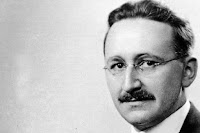Located at Group 11 and Period 7 of the Periodic Table is one of the synthesized ( man made ) Super - Heavy Element that is radioactive. This is Roentgenium.
 |
| Sigurd Hofmann and his Roentgenium |
GSI is Gesellschaft für Schwerionenforschung. The discovery of Roentgenium was lead by Sigurd Hofmann and Victor Ninov, leading the scientist team at GSI. Some of the members are Peter Armbruster, Gottfried Münzenber.
 |
| GSI Logo |
Because Roentgenium is one of the man - made element, so not much is known about Roentgenium, because of its short half life.However, we still know that Sigurd Hofmann and Victor Ninov leading and their scientist team bombarded the atoms of Bismuth - 209 and the ions of Nickel - 64 with a device called Linear Particle Accelerator.
 |
| Victor Ninov |
Roentgenium is predicted to be extremely radioactive, because it was thought that its properties might be similar to the elements of Period 7 ( Francium, Radium and Actinium )
So, in conclusion, Roentgenium is very radioactive.
Atomic Number : 111
Name : Roentgenium
Latin Name : Roentgenium
Electrons per Shell : [ 2, 8, 18, 32, 32, 17, 2 ]
Discoverer : Sigurd Hofmann and Victor Ninov and their scientist team at GSI ( 1994 )
Creator ( Not isolator ) : Sigurd Hofmann and Victor Ninov and their scientist team at GSI ( 1994 )
Element's : Atomic Mass : 272 u ( estimated )
: Density : 28.7 g/cm3
: Type : Transition Metal
Chemical Properties :
Like all Super - Heavy elements, Roentgenium's chemical properties is almost unknown, because of its short isotope's half lives. However, this is what we know.
 |
| Roentgenium isotope |
- Decays through spontaneous fission
- 9 isotopes : 3 of them are : Roentgenium -280 : Protons : 111 : Neutrons : 169 : Electrons : 111 ( Half Life : 4 seconds ) Roentgenium -281 : Protons : 111 : Neutrons : 170 : Electrons : 111 ( Half Life : 17 seconds ) Roentgenium -282 : Protons : 111 : Neutrons : 171 : Electrons : 111 ( Half Life : 2 minutes )
Physical Properties :
- Orange metallic / yellow color ( predicted )
- Highly Radioactive.
- Melting Point : 1124 degrees Celsius ( 2055.2 Fahrenheit ) ( predicted )
- Boiling Point : 3042 degrees Celsius ( 5507.6 Fahrenheit ) ( predicted )

Radioactive Hazard Symbol
How Roentgenium got its name?
Roentgenium is named after the Physicist Wilhelm Rontgen ( Also spelled as Roentgen ), the Physicist who discovered x - rays. Before Roentgenium was officially discovered, like all man - made elements, Roentgenium holds the ' Unknown ' title, named Unununium. It was only officially named Roentgenium in November 1, 2004, where the scientists at GSI suggested the name Roentgenium, in honor of the first X - ray discoverer, Wilhelm Rontgen.
 |
| IUPAC |
Uses
Of course, like all synthesized element do, the uses of Roentgenium is currently unknown. However, we know that Roentgenium is used in labs, mostly to research for another Super - Heavy element.
THIS IS THE END OF ROENTGENIUM
To go to homepage, click this link :
Our Homepage
To go to Chemistry Element page, click this link :
garnetchemistryelement.blogspot.com
To go to homepage, click this link :
Our Homepage
To go to Chemistry Element page, click this link :
garnetchemistryelement.blogspot.com
Thanks for visiting.
If there is any improvements needed, feel free to comment at the comment section below.
Thank you.
Thank you.

